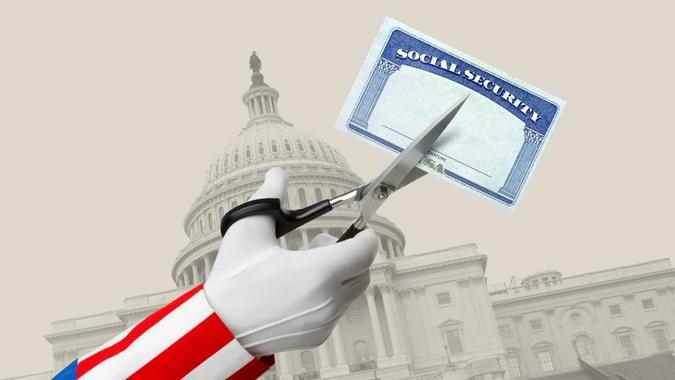While there is no shortage of advice and tips on how to get prepared for retirement, there is also a very long list of myths. And these, coupled with inflation and soaring rates — which have taken a toll on wallets and left little for savings — can end up costing Americans a lot.
Trending Now: 2 Things Empty Nesters Should Stop Investing In To Boost Retirement Savings
Check Out: Cutting Expenses for Retirement? Here’s the No. 1 Thing To Get Rid Of First
If you also factor in a lack of financial literacy about retirement, preparedness becomes even trickier. For instance, The American College of Financial Services Retirement Income Literacy Study found that “older Americans lack actionable retirement knowledge — averaging 31% on a retirement literacy quiz.”
And the study found a direct correlation “between financial literacy and factors such as asset level.”
Here are some of these retirement myths, debunked by experts.

Myth: I should have started saving in my 20s.
Yes, saving earlier is always a good move, but no matter your age, there are actions you can take to set yourself up for retirement, according to Rita Assaf, vice president of retirement products, Fidelity Investments.
“By investing in tax-advantaged accounts, leveraging an employer match in a 401(k) or investing in the stock market to grow existing wealth, there are always options to find what works best for your lifestyle and your money goals,” Assaf said.
Explore More: I’m an Economist — Here’s My Prediction for Social Security If Kamala Harris Wins the Election
Read Next: I’m an Economist: Here’s My Prediction for Social Security if Trump Wins the 2024 Election

Myth: You and you alone determine your retirement timing.
The reality is that people often retire earlier or later than they would have chosen or expected because of factors beyond their control.
“Sometimes it is earlier because of an unexpected layoff, or an injury or illness,” said Bobbi Rebell, Certified Financial Planner, personal finance expert at Cardrates.com, adding that sometimes retirement is delayed because you need to keep working in order to hit your financial goals.
For You: These Are America’s 50 Fastest-Growing Retirement Hot Spots

Myth: You need $1 million or more to retire.
As Stephen Kates, CFP, principal financial analyst, RetireGuide.com, said, $1 million is a nice round number, which makes it an attractive goal for retirees.
“However, many people will be happily retired and thriving with far fewer assets,” he said.
For instance, although Social Security only covers 20% to 40% of most retirees’ incomes, it also reduces the total amount you need to withdraw from investments, he said.
“Retirees also have fewer expenses by paying less in taxes, as well as no longer needing to save for retirement,” he added.

Myth: Expenses will be less in retirement.
Many soon-to-be retirees make the mistake of assuming their expenses will be less in retirement, but that’s not always the case.
While there are some ways to downsize your lifestyle, such as moving into a smaller home or to a state with a lower cost of living, some expenses will increase as you get older, said Steve Sexton, CEO of Sexton Advisory Group.
“Unexpected medical expenses and inflated living costs tend to catch many retirees off guard, making them realize that their expenses either stay the same or increase in their golden years,” he said.

Myth: You can just follow the 4% rule and your money will last forever.
To follow the 4% rule, “you add up all of your investments and withdraw 4% of that total during your first year of retirement. In subsequent years, you adjust the dollar amount you withdraw to account for inflation,” according to Charles Schwab.
However, Rebell noted that while many people are led to believe they can safely take out 4% of their savings and they will always be fine, the reality is that personal needs can change, and you may need more. At the same time, the markets are volatile and risky, and there is no guarantee that investments won’t lose money in any given year, she added.
Be Aware: If You Have $1 Million in Retirement Savings, Here’s How Much You Could Withdraw Per Year

Myth: At 65, you can retire.
Contrary to popular belief, your age is one of the least important factors in retirement, according to Jay Zigmont, PhD, CFP, founder of Childfree Wealth.
“You can retire when you have enough money to pay your expenses, not when you reach a certain age,” he said.

Myth: Once you retire, you don’t have to worry about credit profiles or scores.
“Retirees do need to maintain good credit for many reasons, such as the ability to borrow, said Kyle Enright, president of lending at Achieve.
“You could potentially need a personal or business loan down the road, or maybe even a mortgage,” said Enright.
Your credit also affects your ability to rent an apartment and buy or lease a car, and it factors into your insurance rates.

Myth: Life insurance is a great way to save for retirement.
In fact, life insurance is an insurance contract, not an investment, said Tony Steuer, Chartered Life Underwriter, life insurance analyst, certified personal & family finance educator, financial preparedness advocate at tonysteuer.com.
“Life insurance policies always include a cost of insurance (mortality charge) to pay for the life insurance, and this will lower the rate of return, he said.
“If you borrow money from a life insurance policy, you are charged interest on the loan,” he said.
Steuer added that if you get a life insurance policy with an investment sub-account, the expense charges will typically be higher than on a similar mutual fund.

Myth: Medicare will cover all of your healthcare.
Not so fast, said Kates. Most retirees will need supplemental medical insurance to cover some of their expenses.
“Deductibles and copayments, which can add up, are not covered by Medicare,” he said, adding that dental, vision and hearing care also are not covered by Medicare.
For those who expect to need long-term care or supportive care in their home, exploring additional long-term care or life insurance policies with living benefits may be necessary, he added.
Read More: I’m a Retired Boomer: — 7 Reasons I Wish I Used a Financial Advisor To Plan For Retirement

Myth: Social Security is enough to cover retirement expenses.
In fact, most people will not be able to rely on Social Security benefits alone to cover all their expenses in retirement, which is why having multiple income streams in your golden years is imperative for financial security, noted Sexton.
“When you claim your benefits also determines how much you receive, so if you find yourself retiring earlier than expected, expect to receive a lower monthly benefit,” he added.

Myth: I should put everything into one account to stay organized.
Fidelity’s Assaf said that everyone should diversify their investments.
“Spreading your investing dollars across several types of investments (generally stocks, bonds and short-term investments), known as diversifying, may not boost performance — it won’t ensure gains or guarantee against losses — but it has the potential to improve returns for the level of risk you’re targeting,” she said.

Myth: Social Security is at risk.
While experts predict a Social Security shortfall starting in 2035, there is a minuscule chance that will happen, according to Kates, noting that Congress dealt with a potential shortfall in the 1980s and predicting it will do so again.
One thing retirees can count on is that governmental leadership will not risk crossing the more than 78 million retirees who count on those payments, Kates said.
More From GOBankingRates
- 3 Things You Must Do When Your Savings Reach $50,000
- I'm an Economist: Here's My Prediction for Social Security If Trump Wins the 2024 Election
- 5 Genius Things People With Healthy Savings Do
- Mechanics Explain Why You Should Never Buy These 6 Popular Car Brands
This article originally appeared on GOBankingRates.com: 12 Common Retirement Myths Debunked by Experts
The views and opinions expressed herein are the views and opinions of the author and do not necessarily reflect those of Nasdaq, Inc.



